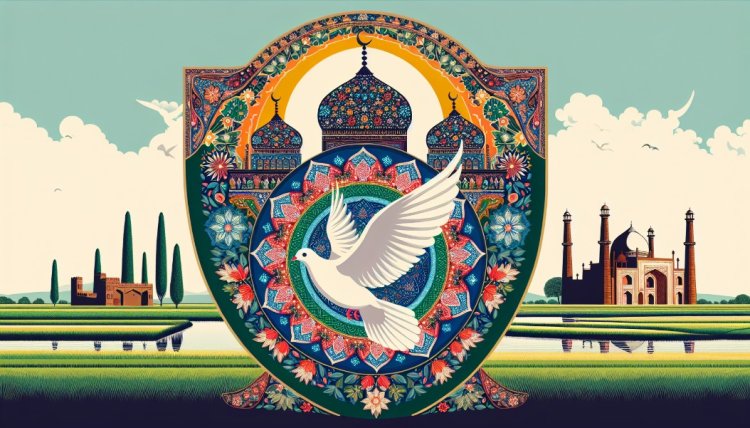Forced Conversions of Hindu Girls in Pakistan: The Disturbing Reality and the Need for Protection
Shattering lives, stealing faith: Forced conversions of girls in Pakistan demand urgent action. Explore the harrowing statistics, human rights violations, and the need for legal protection.

Introduction
The issue of forced conversions of Hindu girls in Pakistan is a disturbing reality that needs immediate attention and protection. Every year, hundreds of Hindu girls are allegedly forced to convert to Islam and are quickly married off to Muslim men, severing their ties with their families. Unfortunately, these conversions occur at an alarming frequency.
One such case that highlights this issue is the story of Simran Kumari. Simran, a Hindu girl, went missing from her aunt's house in August 2020 and was later found at a seminary in Pakistan's Sindh province. She was just 17 years old at the time, and her family believes she was abducted and forced to convert. Despite the clear violation of her rights as a minor, there was a lack of protection for Simran and her family.
This case sheds light on the failure of Pakistani lawmakers to effectively address the issue of forced conversions and provide adequate protection for minors. It is disheartening to see the lack of action and clarity from the authorities, as these conversions should be regulated and authorised by the state rather than left in the hands of individual clerics.
The alarming number of forced conversions, the vulnerability of Hindu girls from lower economic backgrounds, and the lack of resources for families to fight back against these attempts are all factors contributing to the distressing situation. Pakistani lawmakers must step up and criminalise forced conversions, regulate the conversion process, and ensure the safety and well-being of minors.
The disturbing pattern
Forced conversions of Hindu girls and young women in Pakistan follow a disturbing pattern that highlights the urgent need for protection. Statistics estimate that as many as a thousand girls and young women are forcibly converted each year, predominantly from the Hindu minority. These victims often come from lower economic backgrounds, making them more vulnerable to these attempts.
One of the concerning aspects of this issue is the powerlessness of the victims' families to resist or fight back against these forcible conversions. In many cases, these families lack the resources and means to protect their daughters and challenge these conversions legally. This leaves them feeling helpless and unable to ensure the safety and well-being of their children.
It is also crucial to consider the minority status and population figures of Hindus in Pakistan. Hindus account for about 2% of the population, or approximately 4.5 million people, according to government figures. However, Hindu community leaders suggest that the number is closer to 8 million. This minority status further exacerbates the vulnerability of Hindu girls and young women to forced conversions.
The distressing reality of forced conversions of Hindu girls in Pakistan calls for immediate attention and action from Pakistani lawmakers. Clarity and regulation are needed to address this issue effectively. Pakistani lawmakers must criminalise forced conversions, regulate the conversion process, and ensure the safety and well-being of minors.
The Role of Seminaries and Clerics
Seminaries in Pakistan are often identified as hubs for converting religious minorities, particularly Hindu girls. These seminaries play a significant role in facilitating forced conversions and marriages, disregarding the rights and well-being of the victims.
The Specific Case of the Darga Barcundi Sharif Seminary
One notable example is the Darga Barcundi Sharif seminary, located in Pakistan's Sindh province. This seminary has gained notoriety for its involvement in forced conversions. It was at this seminary that Simran Kumari, a Hindu girl who went missing from her aunt's house, was found after being forcibly converted to Islam.
Testimony from a Cleric
A cleric associated with the Darga Barcundi Sharif seminary denies any coercion and claims that the conversions are voluntary. He asserts that Simran Kumari willingly converted to Islam and married a Muslim man. However, such claims should be critically examined, especially considering the evidence of coercion and the vulnerability of the victims.
Preventing Parents from Contacting Converted Children
In some cases, legal action is taken to prevent parents from contacting their converted children. This further exacerbates the distressing situation for families who are already grappling with the loss of their loved ones. The use of legal tactics to isolate and control the converted individuals highlights the lack of compassion and empathy from those involved in the conversion process.
High-Profile Legal Battle
One of the most prominent cases that shed light on the issue of forced conversions of Hindu girls in Pakistan is the high-profile legal battle fought by Harilal, a desperate Hindu father who alleged that his two teenage daughters were kidnapped in March 2019 and forcibly converted.
Despite initially refusing to investigate the case, authorities eventually agreed to take action after Harilal threatened to kill himself outside a police station and a video of his protest went viral. The case gained significant attention across Pakistan, highlighting the urgency of addressing the issue.
The Marriage of the Kidnapped Sisters
Harilal's daughters, Ravina and Reena, were married off to Muslim men who claimed that the girls were 18 and 19 years old. However, their actual ages were 15 and 14, respectively. The sisters now go by the Muslim names Asya and Aisha.
According to Ravina, tensions at home and the allure of social and economic status associated with joining the Muslim majority played a role in their decision to convert. However, their young age raises concerns about the influence of coercion on their conversions.
The Initial Refusal of Authorities to Investigate
One of the most distressing aspects of Harilal's case is the initial refusal of authorities to investigate the kidnapping and forced conversions of his daughters. This lack of action highlights the systemic failures and the lack of protection for victims of forced conversions.
Court Ruling in Favour of the Conversions
In a controversial ruling, the Islamabad High Court declared that Ravina and Reena were not forcibly converted and permitted them to live with their Muslim husbands. The judgement was seen as a victory for Abdul Haq, also known as Miyamita, an influential cleric who runs the Darga Barcundi Sharif seminary.
The court ruling has far-reaching implications, as it sets a precedent that undermines the rights of victims and their families. It further reinforces the power dynamics favouring Muslim clerics and raises doubts about the fairness and impartiality of the legal system.
This high-profile legal battle highlights the urgent need for Pakistani lawmakers to take decisive action to protect Hindu girls and young women from forced conversions. The case also underscores the importance of regulating the conversion process, criminalising forced conversions, and ensuring the safety and well-being of minors.
Calls for Regulation and Action
The distressing reality of forced conversions of Hindu girls in Pakistan has sparked calls for regulation and immediate action to protect vulnerable individuals. Several key points and recommendations have emerged from the investigation by the Human Rights Commission of Pakistan:
-
Better Birth Records and Age Limits for Conversions: Addressing the issue of forced conversions requires better birth records, particularly in rural areas, to accurately determine the age of individuals involved. Implementing a legal age limit of 18 for religious conversions can help prevent minors from being coerced into converting.
-
Provincial Government Authorization and Regulation: The process of religious conversions should be regulated and authorised by the provincial government rather than being left in the hands of individual clerics. This would ensure accountability, transparency, and the protection of individuals' rights.
-
Criminalising Cases Involving Coercion or Force: Cases involving coercion or force in religious conversions should be criminalised to discourage such practices and hold perpetrators accountable for their actions. It is essential to protect the rights and well-being of individuals who may be vulnerable to manipulation and exploitation.
These recommendations aim to provide a legal framework that safeguards the rights and well-being of individuals, particularly Hindu girls, who are at risk of forced conversions. By implementing these measures, Pakistani lawmakers can take decisive action to address the distressing reality of forced conversions and protect the rights of religious minorities.
Reasons for Conversions and Concerns
In Pakistan, the motivation behind conversions from Hinduism to Islam is frequently a desire to get away from oppression and poverty as well as other challenging circumstances. However, there are several concerns surrounding these conversions that need to be addressed.
Arguments for Conversions to Escape Discrimination and Poverty
Many individuals in Pakistan's Hindu community face discrimination and economic hardships. The caste system within Hinduism further exacerbates these challenges, particularly for lower-class Hindus. This can lead individuals to convert to Islam in the hope of finding better opportunities, social acceptance, and economic stability.
The Impact of the Hindu Caste System on Lower-Class Hindus
The Hindu caste system creates a hierarchy that often marginalises lower-class Hindus. They may struggle to find employment and suitable partners within their own community, which can further perpetuate poverty and discrimination. Converting to Islam can provide an escape from these social constraints.
Stories of Individuals Who Converted to Escape Bad Marriages
Some individuals, particularly women, may choose to convert to Islam to escape bad marriages. Domestic violence, incompatible cultural norms, or a desire for more freedom and autonomy can all be contributing factors to this decision. Converting to Islam allows them to dissolve their previous marriage and potentially pursue a better life.
The Continuing Suspicions of Coercion and the Need for Regulation
Despite the reasons individuals may have for converting, there are ongoing suspicions of coercion and forced conversions. These concerns arise due to the alarming frequency of forced conversions, particularly of Hindu girls and young women. It is essential to regulate the conversion process to ensure that conversions are voluntary and protect individuals from exploitation.
Heartbreaking Consequences and the Way Forward
The forced conversions of Hindu girls in Pakistan have devastating consequences for the families and individuals involved. The emotional toll on families trying to reclaim their converted daughters is immeasurable. Parents and siblings are left heartbroken, grappling with the loss of their loved ones and the severed ties with their family members.
Not only do these conversions have emotional consequences, but they also have significant financial implications. Families often lack the resources and means to fight back against these forced conversions legally. They face barriers to accessing legal representation and struggle to navigate the complex legal system. The financial burden of legal battles further exacerbates the distressing situation for these families.
Safety concerns for those who speak out against forced conversions are also prevalent. Those who raise their voices against these conversions often face threats, intimidation, and violence. The fear of retribution silences many individuals and prevents them from seeking justice for themselves or their loved ones.
Despite these heartbreaking consequences, there are individuals like Kumar who remain determined to fight for justice. Their resilience and determination are a testament to the urgency of addressing this issue. Kumar's determination to carry on despite the risks demonstrates the need for support and protection for those fighting against forced conversions.
Internationally, Pakistan has gained recognition as a country of particular concern for religious freedoms. The United States Department of State has declared Pakistan as such, highlighting the violations of religious freedoms within the country. This international recognition emphasises the need for immediate action from Pakistani lawmakers to protect religious minorities, particularly Hindu girls, from forced conversions.
To address the heartbreaking consequences and pave the way forward, Pakistani lawmakers must prioritise the criminalization of forced conversions and the regulation of the conversion process. By criminalising cases involving coercion or force, perpetrators can be held accountable for their actions and deterred from engaging in such practices. Furthermore, the regulation of the conversion process and the involvement of the provincial government can ensure transparency, accountability, and the protection of individuals' rights.
Pakistani lawmakers must acknowledge the distressing reality of forced conversions, listen to the concerns of affected families, and take immediate and decisive action to protect the rights and well-being of religious minorities in the country.



 admin
admin 










